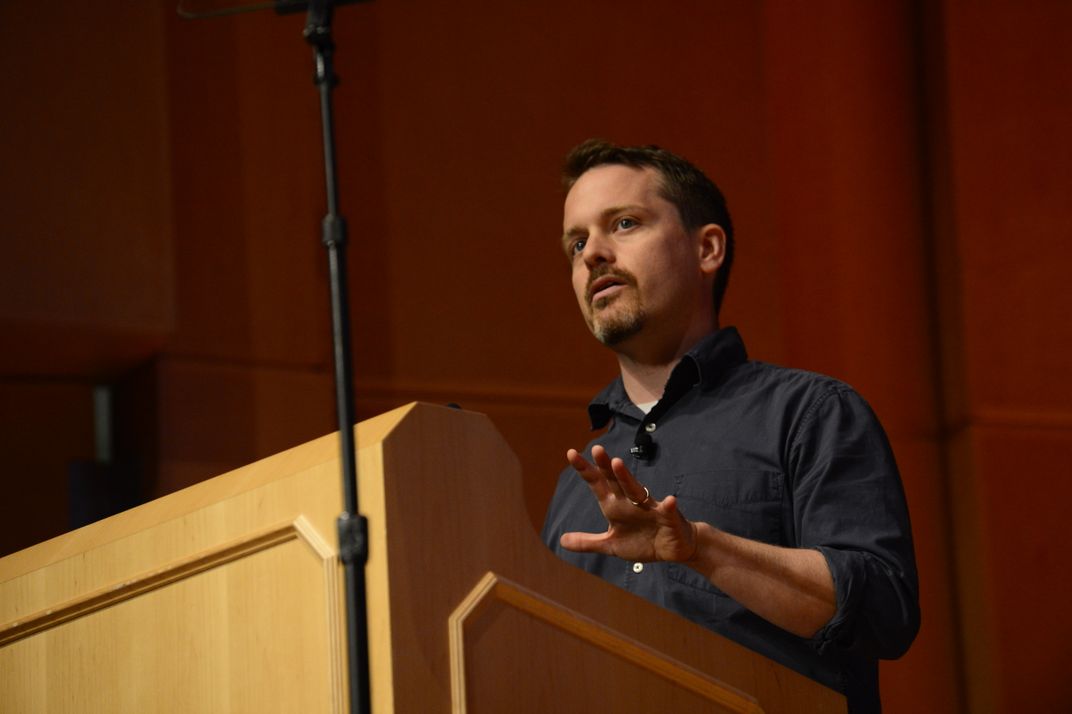The Future is Here: What’s Next For Mobile Phones?
Anthropologist Joshua Bell weighs in on new uses for cell phone technology at Smithsonian magazine’s annual festival
:focal(2701x454:2702x455)/https://tf-cmsv2-smithsonianmag-media.s3.amazonaws.com/filer/68/cc/68ccfaf9-7532-4082-8ac5-96653427f4a7/42-56679376.jpg)
Forty-one years ago, Martin Cooper, an engineer for Motorola, had an audacious idea: He wanted people to be able to carry their phones with them anywhere. Sure enough, in April 1973, Cooper—who’s now credited as the “father of the cell phone”— became the first individual to make a call on a portable mobile device. The phone weighed more than two pounds, and it took 10 hours to charge it for a mere 35 minutes of conversation. It was a far cry from today's sleek handheld devices—and with its $3,995 price tag, it was hard to imagine it ever becoming a crucial tool in everyday life, used by everyone from jet-setting businessmen to elementary school children.
Today, smart phones are an inexorable part of our existence, a fact that isn’t lost on Joshua Bell, an anthropologist and curator of globalization at the Natural History Museum. For the past two years, Bell and Joel Kuipers, an anthropologist at George Washington University, have researched mobile phone culture, along with the myriad facets—ecological impact, cultural variability— that underlie the now-global phenomena.
Bell, who’s currently developing a new exhibition tentatively called “A Natural History of the Mobile Phone,” was this weekend’s first featured speaker at Smithsonian magazine’s 2nd annual “The Future is Here” Festival. A scholar of how cell phones shape our modern lives, Bell took cues from both science fiction and his own research to offer up scenarios on how mobile technology will change...and in the process, change us.
Cell phones will become a part of us...literally
Bell referenced the 2012 remake of the dystopian science fiction film Total Recall; it featured "interesting speculative technology"—implanted circuitry, which allowed a palm to become a keyboard for a personal device on which smart surfaces let users interface with others and a wider grid. Of course, the innovation had its drawbacks: the film's protagnoist, played by Colin Farrell, eventually removes the device from his body because it allows others to trace his every move.
The film doesn't mention how such devices will be powered. Bell said, however, that they could become a reality based on both nanogenerators harvesting movements and bio-electronic currents.
Such technology raises nebulous—and possibly troubling—questions . "In such a future, one has to ask where one's self ends and begins," Bell notes. Such interfaces raise possibilities of "personal viruses" that could let individuals hack and steal specified information from each other. "It doesn't take much to envision a world where people access different apps that could both activate or suppress different genomic make-up or amplify our capacities," he reflected.
Intelligent operating systems will make us question what it truly means to be human
Before evolving beyond humans and leaving us behind, says Bell, figures like Hal 9000 in Stanley Kubrick's 2001: A Space Odyssey (1968) and Samantha, the female talking operating system in the Spike Jonze film Her (2013) will have meaningful relationships with us—"again, raising the issue of what it means to be embodied."

Cell phone owners will learn how to rewire, turn off and repair their devices
For the past three years, Bell has followed the work of cell phone repair technicians in Washington, D.C. They fix broken smart phones and other mobile devices, and in doing so, reverse-engineer devices that can be updated and modified but aren't often overhauled due to consumer culture and warranty deals.
These technicians, says Bell, are spurring novel insights into how to manipulate devices built by larger corporations. Part of the "Maker Culture," or the "DYI" movement, they are also reminiscent of the global network of makers and hackers that flourish in South Africa, Asia and Africa.
Someday, says Bell, we'll all be "hackers" in a sense, and able to make changes to our own technology instead of merely purchasing new models. "Does that mean I think in 100 years from now we'll all be engineers?" he asks. "I'm not so sure. But regardless of individuals' professions, some basic technical literacy will be essential."
Open-source technology will promote democracy, connect us globally and allow us to improve our phones
"Open-source is the only way to have a redemptive future with our technology—not only to even out its unevenly-distributed nature, but so that we can work to create better devices," says Bell. By becoming a part of technology itself, we'll fear it less... and as a result, we'll will also "push the boundaries of what it means to be interconnected, alive and human."
/https://tf-cmsv2-smithsonianmag-media.s3.amazonaws.com/accounts/headshot/Fawcett-Bio.jpg)



/https://tf-cmsv2-smithsonianmag-media.s3.amazonaws.com/accounts/headshot/Fawcett-Bio.jpg)